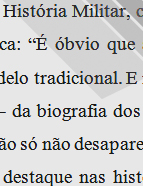

................................
Military h istory has traditionally been the domain of "military historians," who were often criticised for their lack of methodological sensitivity and their status as non-professional historians, merely cultivators of national history. Their historiographical practices were frequently characterised by encomiastic impulses, moralistic exemplification, and excessive metaphorisation. This approach to "writing history" was essentially descriptive, rarely engaging in the specific problematisation of events or individuals , per se .
However, with the decline of structuralist and Marxist paradigms in the historian's craft by the late 1970s, interdisciplinary and institutional dialogues multiplied. This allowed for new theoretical-thematic perspectives related to the fields of Social History and the New Cultural History. The emergence of entirely new and distinct historiographical demands led to a rupture in the identity and affinity between g eneral h istory and m ilitary h istory. Consequently, historians began to prioritise military studies, including through socio-economic perspectives, anticipating increasing specificity and academic recognition in the field. " In fact, for decades—particularly following criticism from the French school of thought directed at the so-called battle-history , and later with the diminishing status of event-based and political history in favour of studies predominantly shaped by Marxist influences on the remnants of "material culture"—discussing wars and battles, military leaders and soldiers, castles, fortresses, swords, and cannons, as well as the suffering and glory unique to the intensity of combat in an engaged and systematic manner was at times regarded in academic circles as "outdated" and even "unscientific." Such subjects were relegated to the domain of eccentric nostalgics clinging to outdated positivist historiography or to mere caricatured collectors of facts. This perception, however, was eventually overturned by a broader expansion of historical interests and methodologies, further aided by a particular "trend" in military themes, especially evident from the 1970s onwards. Interest in this field grew substantially due to recent conflicts such as those in the Persian Gulf and the former Yugoslavia, which underscored the significance of cultural factors and the role of public opinion—amplified through media influence—in shaping the trajectory of war. The revitalisation of this area of historical inquiry on an international scale serves as proof of this shift, now enriched by innovative methodological approaches and benefiting from productive exchanges with other disciplines. (Rui Bebiano, «Sobre a Historiografia…» [On Historiography…], 1992, pp. 301–302).
This work is financed by national funds through FCT - Foundation for Science and Technology, I.P, in the scope of the projects UIDB/04311/2020 and UIDP/04311/2020.
